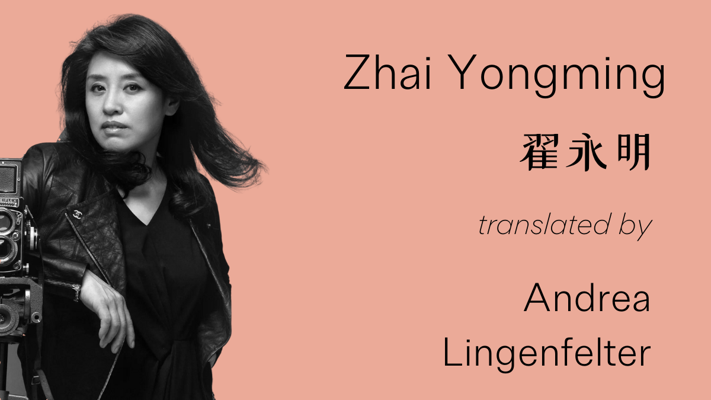Selected poems from Following Huang Gongwang through the Fuchun Mountains
Zhai Yongming 翟永明 established herself as a major poet in mainland China in the 1980s with the strikingly visceral imagery and uncompromising feminist voice of poem cycles like ‘Woman’ and ‘Tranquil Village’. Influenced by mid-20th century American Confessional poets like Sylvia Plath, Zhai’s early poems resonated with readers and secured her place in modern Chinese letters. As Zhai Yongming has continued to develop as a poet, she has brought her feminist critique to China’s past, revisiting and reappraising historical figures like Yu Xuanji and Yang Guifei and presenting new interpretations that push back against historiographic misogyny. While much of Zhai Yongming’s social conscience is informed by her feminism (e.g., in poems like ‘Report on a Child Prostitute’), she hasn’t shied away from confronting other forms of inequality, such as the role of official corruption in the devastation of the 2008 Wenchuan earthquake (‘The Testament of Hu Huishan’). Throughout her career, she has remained socially and politically engaged.
In addition to her literary practice, Zhai Yongming has long been active in art circles, particularly in Chengdu, where her White Nights café and bar has been the site of many literary and art events and exhibitions. She herself has also put on installations. Thus, it should come as no surprise that Zhai’s interest in history and visual art would intersect with her social engagement as they have in ‘Following Huang Gongwang Through the Fuchun Mountains’ 随黄公望游富春山(2015), a book-length ekphrastic eco-poetic sequence on the 14th century painter Huang Gongwang’s (1269 – 1354) landscape scroll Dwelling in the Fuchun Mountains 富春山居圖. In this 30-poem sequence, Zhai meditates on the environment and environmental degradation, landscape and landscape painting, past and present, aesthetics, and world events. Zhai Yongming had earlier touched on these themes (e.g., ‘In Springtime’, ‘In Ancient Times’), but in ‘Following Huang Gongwang Through the Fuchun Mountains’, she goes deeper, and the leisurely journey through the Yuan dynasty ink painting affords her ample space to respond to the work and to reflect on its many layers of meaning. A hybrid text that incorporates abundant quotations, allusions, and footnotes, ‘Following Huang Gongwang Through the Fuchun Mountains’ has the richness of a scroll inscribed with colophons, or a traditionally annotated classical text.
Zhai Yongming’s encounter with Huang’s painting is a subjective-objective reading of the painting, and the poems chosen for this feature reflect the breadth of Zhai Yongming’s interests. Poem I introduces some of the historical background to the painting and includes the poet’s notes; poems V and VI, which don’t have notes, touch on the loss of body and soul of young people in the digital age and the healing and transcendental power of art respectively; poem VII focuses on one of the most famous incidents in the history of this painting, in which a self-centered and obsessive collector damage the painting in an attempt to burn it so that it would accompany him to the afterlife; and poem XXI, which appears roughly 2/3 of the way through the poem sequence, brings us to the present time (2014 or 2015, when Zhai composed these poems). In poem XXI, Zhai reflects on her gender and thinks about how she fits into a painting created at a time when women poets and artists were marginalized. She also reflects on the news of the day, which gives this poem a great deal of extra dimensions.
Zhai shows us how this landscape painting can remind us of all that we have lost as well as pointing to what remains and is worth preserving, and she also acknowledges the role of the artist as a witness and a custodian of historical memory. — Andrea Lingenfelter

Selected poems from Following Huang Gongwang through the Fuchun Mountains
Paper Republic, (Online)
Aug. 2022
Translated by Andrea Lingenfelter, from works by Zhai Yongming

